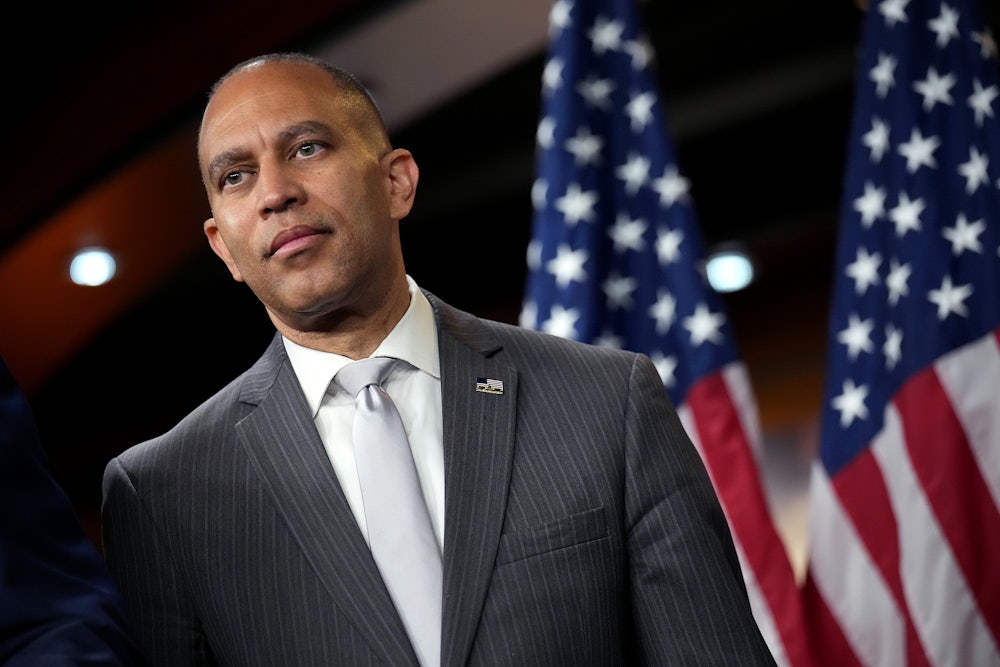Andrew Cuomo’s back—or rather, he’s refusing to go away. This week, the former Democratic governor and onetime presidential aspirant announced he will continue contesting the race for New York City mayor, despite having decisively lost the Democratic primary earlier this month to Zohran Mamdani. And Cuomo announced his general-election campaign in perhaps the cringiest way imaginable: with a video that tried to ape Mamdani’s youthful social-media strategy and streetcorner appeal, but instead resembled a elderly hostage’s proof-of-life. No wonder it got ratioed; as of this writing, Cuomo’s post had around 5,000 likes on Twitter, while Mamdani’s comment below the video—he simply shared a link for donations—sits at 180,000.
Cuomo’s decision to run a third-party campaign against the Democratic nominee, after Democratic voters decisively rejected him in favor of that nominee, does not exist in a vacuum. It comes as a number of centrist Democratic leaders—including Senate Minority Leader Chuck Schumer, House Minority Leader Hakeem Jeffries, and New York Governor Kathy Hochul—have refused to endorse Mamdani. MSNBC’s Chris Hayes challenged Jeffries on Tuesday, asking why he wasn’t backing a Democratic nominee in Jeffries’s own city: “What do you say to people who say, ‘What gives? Why are you not endorsing the guy who won the Democratic primary in a contested election in your backyard?’” Jeffries’s response was the same gobbledygook we’ve come to expect from him, which is to say it’s not even worth quoting here.
Other Democrats have gone even further. New York Senator Kirsten Gillibrand went on a bigoted rant falsely claiming Zohran supported “global jihad” (she later apologized). Dean Phillips, the former congressman who challenged President Biden for the Democratic nomination last year, said he ultimately believed there was no room in the party for “socialists” like Mamdani (who is a democratic socialist, specifically). And the list goes on.
These skeptics and naysayers will likely have little effect on the actual general election results come November. Mamdani, who earned more votes than any candidate has ever earned in the history of New York City Democratic primaries, has significantly higher favorability ratings among voters than any of his critics. But the failure of so many centrist Democrats to rally around the Democratic nominee in a race to lead the biggest and most culturally dominant city in America does effectively illustrate an underrecognized and often misrepresented dynamic in Democratic politics: that it is actually the party’s centrist establishment, not its progressive wing, that’s most likely to violate the maxim of “Vote Blue No Matter Who.”
This is worth noting, because for years it’s been centrists who have used “Vote Blue No Matter Who” as a cudgel to discipline progressives by equating criticism of the party establishment with a refusal to back Democrats in general elections. Those who have tried to push the party to change course—to embrace universal healthcare, support a ban on stock trading, elevate younger leaders—have probably at some point been scolded to “Vote Blue No Matter Who,” as if pushing Democrats to be better is partisan treachery. But this charge has never been based in reality. In fact, the go-to examples used by these centrist scolds to support their claims against progressives militate in the opposite direction.
Take Bernie Sanders. I know nobody wants to relitigate 2016, but there are still many in the Democratic establishment—from politicians to consultants to influencers—who charge both Sanders and his supporters with not backing Clinton in the general election against Donald Trump. This is a claim that can be empirically tested, and it is objectively false. Sanders went all in for Clinton following her official nomination by the party, holding an astonishing 39 rallies in the final months of the election. This was widely recognized at the time—a sampling of major outlets’ headlines in the fall of 2016 include “Bernie Sanders Packs Schedule With Campaign Stops for Hillary Clinton”; “Bernie Sanders Goes to Bat for Clinton in Her Fight to Win Over Young Voters”; “Bernie Sanders’s Hard Fight for Hillary Clinton”; and “Bernie Sanders Goes ‘All In’ for Hillary Clinton.”
It’s also not true that Sanders’s supporters disproportionately refused to vote for Clinton. Indeed, a higher percentage of Sanders’s voters backed Clinton in 2016 than Clinton’s supporters backed Barack Obama in the 2008 general election. The same applies to the 2020 election, when progressive candidates and voters rallied overwhelmingly behind Biden (though it’s worth noting that Biden’s winning campaign made much more of an effort to reach out to and engage these constituencies than Clinton’s did). In each of these elections, progressives overwhelmingly accepted their disappointing primary losses and got to work supporting their non-preferred Democratic nominees in the general election.
A more recent example that establishment Democrats frequently invoke to accuse the party’s left wing of insufficient loyalty is the Uncommitted campaign, an effort by Palestinian, Muslim, and progressive Democrats to push Biden to change his morally and politically disastrous support for Israel’s war on Gaza by voting “uncommitted” in the 2024 Democratic primary. What these accusations ignore is that the Uncommitted campaign was explicitly a primary strategy. As one of its organizers, Waleed Shahid, explained, the effort was based on a “disciplined hypothesis: that a protest vote in the primaries, executed inside the party of which we were members, could force a recalibration early enough to matter. We weren’t trying to blow up the coalition. We were trying to keep it alive.” Compare this approach to that of the many establishment Democrats who worked hard to clear the 2024 primary of any credible alternatives to Biden—an act of supposed party “loyalty” that proved fatal for the Democratic Party, and brought us a second Trump administration.
Of course, the Uncommitted campaign’s hypothesis proved incorrect—neither Biden nor Kamala Harris were ultimately swayed to make even the smallest possible effort to appeal to voters horrified by their unflagging support for Benjamin Netanyahu’s genocide. And, as Uncommitted predicted and tried to prevent, this led to a collapse in Harris’s support among Muslim voters (perhaps best exemplified by the eye-popping 117-point shift in the heavily Arab American city of Dearborn, Michigan, which flipped from 88 percent support for Biden in 2020 to just 13 percent support for Harris in 2024). And yet, despite Harris’s utter rejection of the campaign, including even its most minor and symbolic of demands, Uncommitted remained committed to defeating Trump, publicly urging supporters to vote for Harris in the general election because, as Uncommitted leader and Palestinian state representative Ruwa Romman wrote in a Rolling Stone essay addressed to her community, “people in my district and state cannot survive another Trump presidency.”
This gets to the fundamental contrast at issue here. The establishment deploys “Vote Blue No Matter Who” against progressives who try to use primary processes to influence the party’s direction, despite the fact that after those primaries—which the left loses far more often than it wins—progressives invariably assume the posture of good Democratic soldiers. Centrists, on the other hand, scold progressives who are critical of the party establishment during primaries, but on the rare occasions they lose those primaries, they can’t be counted on to reciprocate that support. As Rep. Alexandria Ocasio-Cortez put it to a NY1 reporter: “I, as a Democrat, support the Democratic nominee. It’s disappointing to see how people want the party to rally behind the nominee when that nominee is them—and then that principle gets thrown out the window when the nominee is someone they don’t like.”
It’s easy to say “Vote Blue No Matter Who” when that means voting for your own worldview, interests, and preferred Democratic candidate. It’s a lot harder when it requires supporting someone you deeply oppose on issues that are critically important to you. Progressives have spent our entire lives swallowing our feelings to do the latter, and still getting attacked by the establishment with accusations of disloyalty. But the moment the dynamic flips—as occurred with Mamdani’s victory in New York, where, it should be noted, he faces a contested general election against at least one candidate who is essentially a puppet of Donald Trump, and another who’s been practically endorsed by him—the establishment proves its loyalty is not to the Democratic Party, but to its own ironclad control of the party.
Rather than allow ourselves to be framed as an untrustworthy partner within the Democratic coalition, it’s time for progressives to reclaim our role as the most committed core of that coalition: We represent, in the words of the late Senator Paul Wellstone, the “Democratic wing of the Democratic Party.”






